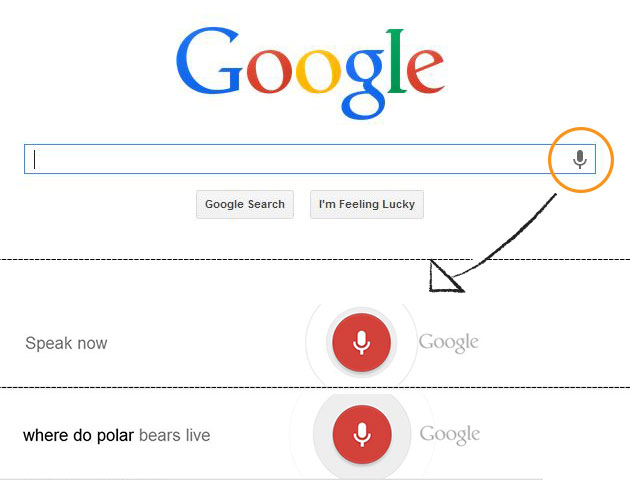
Earlier this year, Google unveiled voice search in the form of a small microphone on the right side of the search bar. Since then, it has quickly improved in quality for conversational speech. With the popularity of Siri for iPhone, Google and Android users will benefit from a competitive product for ease of use.
Conversational Speech Search
The highlight of conversational speech is just that, we can search for things in a more natural manner as people tend to talk in complete sentences and not short or long-tailed keywords. Voice search has a few flaws in comprehension but it continues to improve week over week. You can see it thinking in action as it tries to decipher what you say into something that actually makes sense.
Google also rolled out Nutritional Search, which currently allows users to ask what the nutritional value of over 1,000 fruits, vegetables, meats, and meals are. You can ask specifically what the calories, fat, cholesterol, sodium, protein, etc. of different foods are and it also give the serving size as well as a Wikipedia definition of it.
Voice Search Affects Local Search
Although Voice Search may at first seem like just a fun added benefit from Google, the behavior of people show that local-based Voice Search is gaining in popularity. Imagine you are walking around downtown to meet up with a friend and you get distracted and go off-course. Then simply pull up Voice Search on your Android and say, “Where’s the Denver coffee shop?” No need to type in, “Denver coffee shop.” Then choose the location and go.
Google will also remember your previous searches to help give you more educated results when using Voice Search. With these things in mind, local businesses ought to keep their local onsite profiles up-to-date on their websites, Google+, Yahoo!, Bing, etc. Optimization for Voice Search will be focused on search phrases and a FAQ type manner.
Global Enterprises
Big brands and enterprises that struggle to rank with highly competitive terms should look to Voice Search for help, even if they do not have brick and mortar stores. Similar to local Voice Search, enterprises will have more success by targeting Voice Search phrases and FAQ language on their sites. A focus on branding with long-tail keywords reinforces consumer perception that your brand is the resource and go-to for information. This also follows the new keyword strategy that Google is pushing marketers towards by omitting keyword search queries with the “(not provided)” section, which is a return to branding and trust.
As we are living in the “one screen world” where all are screens are becoming more streamlined to provide the same information but on different sizes, optimizing for mobile search, utilizing Voice Search, and providing a great user experience is the direction that SEO marketers need to focus on.
If you have any questions on how to optimize for Voice Search or need help with your local search, please contact us today.

